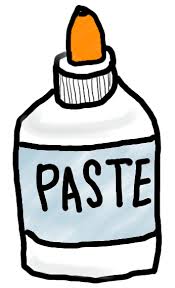paste
英 [peɪst]
美 [peɪst]
- vt. 张贴,裱糊;用浆糊粘
- n. 面团,膏;糊状物,[胶粘] 浆糊
- n. (Paste)人名;(法)帕斯泰
使用频率:

记忆方法
将“paste”想象成一个动作:想象自己在“拉”(pull)一条软绵绵的带子,即“past”e,这个过程就像粘贴一样。这种方法通过将动作与单词形态相联系,帮助记忆。
以上内容由AI生成, 仅供参考和借鉴
中文词源
paste 面团,粘贴
来自拉丁语pasta,面团,面食。引申词义面糊,胶体,胶状物,粘贴等。
英语词源
- paste
-
paste: [14] Greek pástē denoted a sort of ‘porridge made from barley’ (it was a derivative of the verb pássein ‘sprinkle’). Late Latin borrowed it as pasta, by which time it had come to mean ‘dough’. From this were descended Italian pasta (acquired by English in the late 19th century) and Old French paste, source of English paste. This at first meant ‘pastry, dough’, a sense now largely taken over by the related pastry.
The meaning ‘glue’ did not emerge until the 16th century, ‘soft mixture’ until as recently as the 17th century. Other related forms in English include pastel [17], which comes via French from the Italian diminutive pastello; pastiche [19], which comes, again via French, from Italian pasticcio ‘pie’, hence ‘hotchpotch’; and pasty [13], paté [18], and patty [18], all of which go back to medieval Latin *pastāta.
=> pasta, pastel, pastiche, pasty, paté, patty - paste (n.)
- c. 1300 (mid-12c. as a surname), "dough," from Old French paste "dough, pastry" (13c., Modern French pâte), from Late Latin pasta "dough, pastry cake, paste" (see pasta). Meaning "glue mixture" is first attested mid-15c.
- paste (v.2)
- "hit hard," 1846, probably an alteration of baste "beat" (see lambaste). Related: Pasted; pasting.
- paste (v.1)
- "to stick with paste," 1560s; see paste (n.). Related: Pasted; pasting.
权威例句
- 1. Make deep slashes in the meat and push in the spice paste.
- 在肉上切出深深的口子,再把辣酱塞进切口中。
- 2. Using a whisk, mix the yolks and sugar to a smooth paste.
- 用打蛋器将蛋黄和糖打成均匀的糊状。
- 3. Blend a little milk with the custard powder to form a paste.
- 往蛋奶沙司粉里加入一点儿牛奶,搅成糊糊。
- 4. Combine the flour with 3 tablespoons water to make a paste.
- 往面粉里加3大勺水揉成面团。
- 5. Blend the cornflour to a smooth paste with a little cold water.
- 加入少量的凉水,将玉米粉搅拌成均匀的糊状。